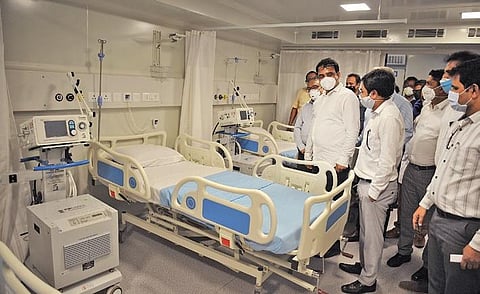

BENGALURU: Eight months after the first Covid-19 case was reported in India on January 30, “there is still no scientific evidence to support a specific line of prophylactic or treatment including convalescent plasma (CP),” said Dr Rajni Kant Srivastava, Director, ICMR-Regional Medical Research Centre (RMRC), Gorakhpur and head, Division of Research Management, Policy, Planning and Coordination (RMPPC) at ICMR, New Delhi.
Speaking to The New Indian Express, he said that the ICMR has not found any scientific evidence to support the efficacy of CP therapy or any set of prescribed drugs that have been found to be effective on some patients. A lot of drugs are being “repurposed” as prophylactic or for treatment of Covid-19. It is a new virus and not much is known about it, yet, he added.
The ICMR in its recently published PLACID trial report has indicated that there was no difference in the mortality or progression to severe disease among moderately ill Covid-19 patients treated with CP along with basic standard care compared to basic standard care alone.Dr Srivastava said, “Wearing masks, maintaining social distance and hand hygiene are a must to minimise the spread of Covid-19.”
Regarding reports on re-infection in some patients, he said, “It is still too early to comment on this. It depends upon the presence, extent and duration of antibodies in an individual to fight the virus. This is where a person’s immune system plays a vital role,” he added.On the increase of Covid-19 cases in India, Dr Srivastava said that aggressive testing and unlocking of economy are two important factors behind the escalating numbers. “It will be difficult to assess at what stage of the pandemic we are. We are, however, nowhere close to getting herd immunity,” he added.
The focus right now is on the three, including two indigenous vaccines that are being developed in the country, but there will be “no shortcuts in the clinical trials,” he said. “Drug trials take years. It took nearly a decade to come out with an effective vaccine for polio. How can we expect a vaccine for Covid-19 in six to seven months? The three vaccines (‘Covaxin,’ developed by Bharat Biotech in collaboration with the ICMR, ‘ZyCoV-D’ by Zydus Cadila and Oxford-AstraZeneca, which under the nod of the DGCI is being developed by the Serum Institute of India) are at various stages of trials and we hope to see some positive results in the next six months. If all goes well, we may come out with the first vaccine in the world,” he added.
Dr Srivastava said that in March India was importing N95 masks, testing kits etc. “Today we are exporting medical supplies to other countries. There has been unprecedented support from the government and private stakeholders in handling the pandemic and the vaccine under Prime Minister Modi’s Atma Nirbhar Bharat programme,” he said.